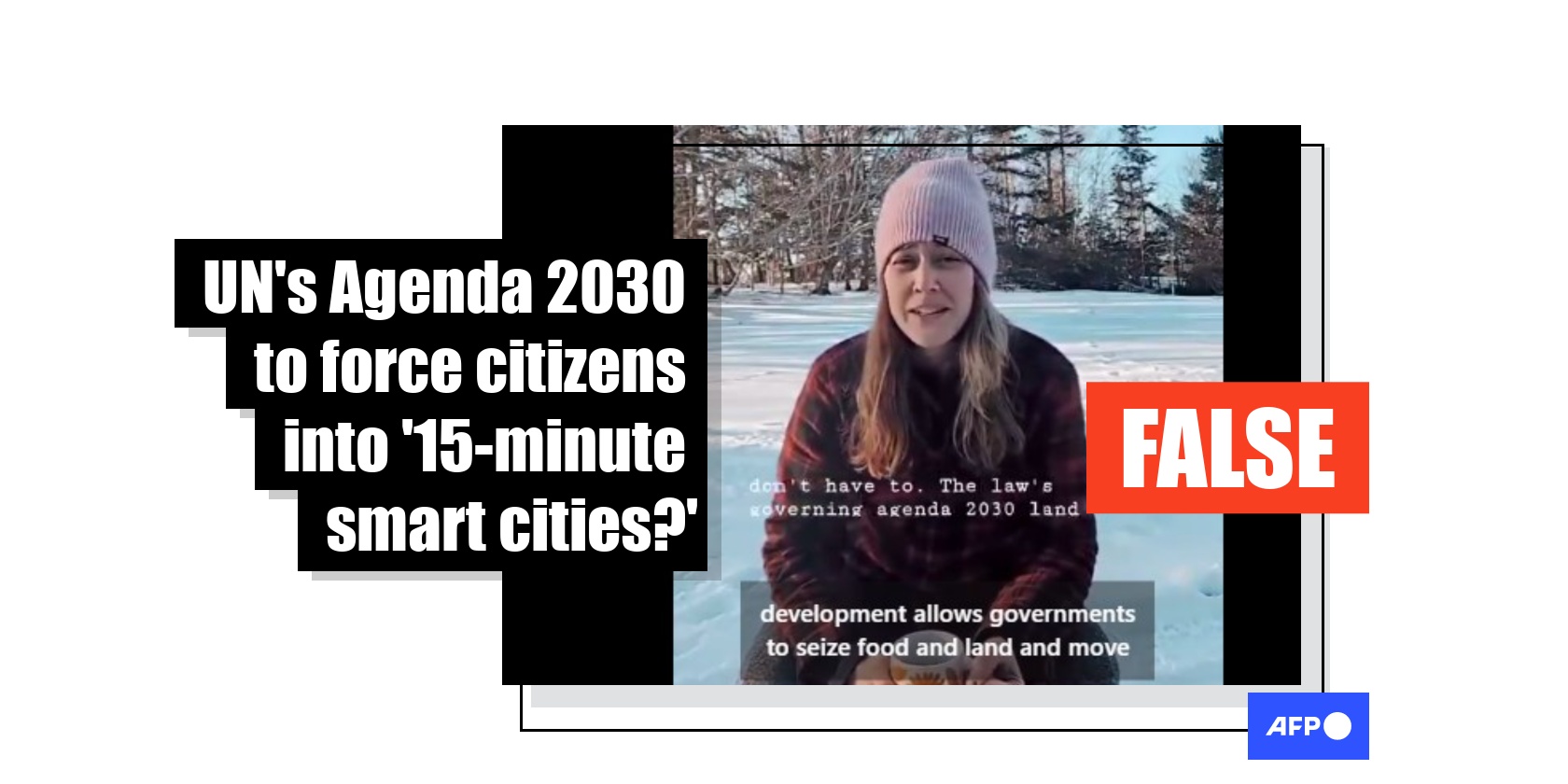
Videos spread false claims about urban redesign plans
- This article is more than two years old.
- Published on March 10, 2023 at 23:04
- 3 min read
- By Marisha GOLDHAMER, AFP Canada
"According to the laws governing Agenda 2030 land development, any land deemed toxic, the government can seize it and kick everybody out and put people in 15-minute cities," says a woman in a February 22, 2023 TikTok video that also spread on Facebook.
Another video posted to a Canadian Facebook group on February 21 says: "Think of it like this, it's less of a 15-minute 'smart city' and more of a confinement community ... If the land and water around you is completely poisoned, you don't get to opt out of the smart city model that's coming."
A third video posted February 23 warns residents will be issued a digital ID that will track their daily movement and consumption.
"They will be given 15-minute travel times to complete their daily activities unless they have a permit," says a woman in the clip. "And if they exceed those 15 minutes, they can be denied access to their spending and their activities that they need to do for the day."

The videos include baseless claims that recent toxic chemical spills or factory fires in the United States were intentional schemes to force people into urban redevelopment projects. But experts say such plans do not control citizen movement.
Smart cities
The videos falsely claim "smart" in "smart cities" is an acronym for "Surveillance Monitoring Analysis Reporting Technology." AFP has debunked similar assertions.
Cities are looking for new ways to connect their citizens through the internet of things and improve public transit to reduce traffic congestion.
Shadi Shayan, a lecturer at the University of South Australia who has studied public perceptions of smart cities, said the aim of data collection in these areas is "better decision-making regarding city operations with the ultimate goal of improving residents' quality of life."
The World Economic Forum -- a regular target of disinformation -- has established an alliance to ensure "responsible and ethical use of smart city technologies."
Through this alliance, 36 cities -- including Toronto in Canada and Chattanooga, Dallas, Pittsburgh and San Jose in the United States -- are pioneering projects to improve access to information and plan for forthcoming technologies, such as autonomous vehicles. In Toronto, the project implemented automated water meters, among other measures.
There are legitimate privacy concerns when it comes to how governments could use and store data collected in smart cities. But the claim that such plans will introduce 15-minute travel limits is unfounded.
The videos appear to repeat false claims about restrictions on movement under the 15-minute city urban design philosophy. Carlos Moreno, a professor at Paris's Sorbonne University, created the concept.
"The idea is actually simple -- instead of spending hours on end in transport, we can bring all the essential things that people need closer to them," he told AFP.
Raktim Mitra, an urban planner and associate professor at Toronto Metropolitan University, said smart cities may embrace such principles, but emphasized that the focus is on making infrastructure efficient and sustainable -- not controlling individual citizen consumption or movement.
"15-minute city, it's not a regulatory tool. It's a planning and design concept," he said.
Agenda 2030
The videos also misrepresent the 2030 Agenda for Sustainable Development.
UN member states, including the United States and Canada, agreed to the goal of eradicating poverty in a sustainable way at a September 2015 meeting, updating the previous Agenda 21.
The latter plans -- said to be "a shared blueprint for peace and prosperity for people and the planet" -- have been the target of misinformation for years.
"The claim that the UN can allow governments to forcibly remove people from their land is untrue," said Farhan Aziz Haq, deputy spokesman for the UN secretary-general. "The UN does not have an enforcing mechanism."
He said each country will decide how to achieve the Agenda 2030 goals and targets.
The agreement does have goals pertaining to cities, but it does not specifically mention "smart cities," focusing instead on issues like waste management and air quality.
"The UN cannot force countries to implement the goals," Haq said.
AFP has reported on misinformation surrounding 15-minute city plans in Oxfordshire, United Kingdom and the Canadian cities of Edmonton, Mississauga and Ottawa.
Copyright © AFP 2017-2026. Any commercial use of this content requires a subscription. Click here to find out more.
Is there content that you would like AFP to fact-check? Get in touch.
Contact us
